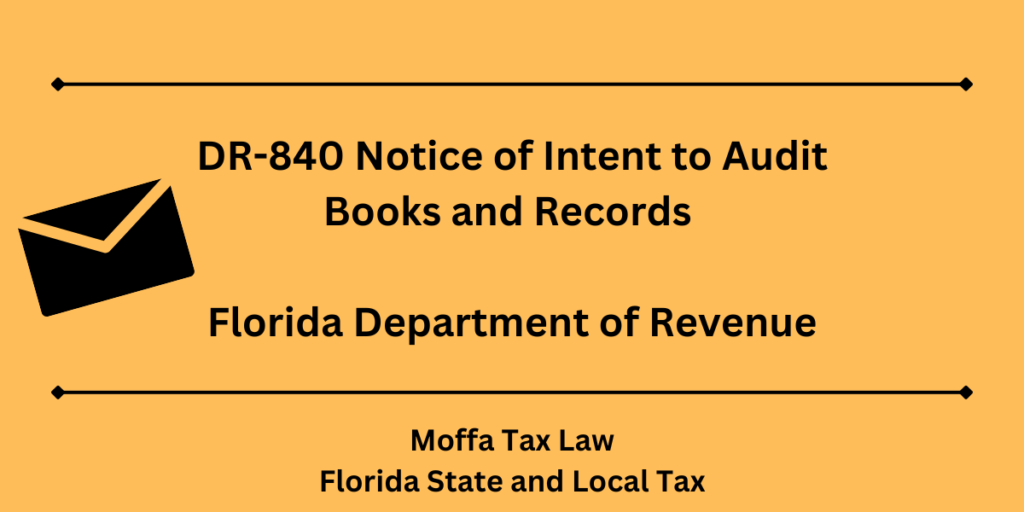NEWS & INSIGHTS


What is the DR-840 Notice?
The DR-840 Notice of Intent to Audit Books and Records is a formal notification from the FDOR that your business has been selected for a tax audit. This notice is typically issued for audits involving sales tax, use tax, corporate income tax, or other state-administered taxes. It serves as the starting point of the audit process and outlines key details about the audit, including:
Type of Tax Under Review: Specifies the category of tax the audit will focus on, such as sales or corporate income tax.
Audit Period: Identifies the specific timeframe being audited.
Records or Documents Requested: Lists the documents you need to provide for review.
The notice may also include information about the auditor assigned to your case, timelines for the audit, and instructions for scheduling an initial meeting. Responding promptly and understanding its requirements can significantly impact the audit’s outcome.
Why Did I Receive a DR-840 Notice in 2025?
The FDOR selects businesses for audits for several reasons, including:
Random Selection: The FDOR conducts routine audits as part of its compliance program, and your business may have been chosen randomly. This helps ensure all businesses adhere to Florida’s tax regulations.
Discrepancies in Reporting: If there are inconsistencies between your tax filings and other data reported to the state (such as vendor reports or bank statements), it could trigger an audit. Examples include reporting significantly lower taxable sales than industry norms.
Industry-Specific Risks: Businesses in industries prone to cash transactions, such as hospitality or retail, or those with complex tax rules, like construction, are more likely to be audited. These industries often have unique compliance challenges that require closer scrutiny.
High or Unusual Deductions: Large deductions, exemptions, or credits that deviate from industry norms can attract scrutiny. Claiming significant expenses without proper documentation may prompt further review.
Prior Compliance Issues: If your business has a history of late filings, errors, or noncompliance, it could increase the likelihood of an audit. Previous penalties or warnings from the FDOR might also make your business a target for future audits.
Whistleblower: If your receive an audit notice at the start of 2025, it may be for any of the reasons above or it may be the result of an unhappy employee, customer, or competitor who has reported you to the Department of Revenue. The Florida Department of Revenue will not disclose to you who reported your, or whether the audit was initiated by such a report.
What Does the DR-840 Notice Mean for My Business?
Receiving a DR-840 notice doesn’t automatically mean you’ve done something wrong. Instead, it signals that the FDOR wants to review your records to verify compliance with state tax laws. However, it’s critical to take this notice seriously, as the audit findings can have significant financial and legal consequences.
Potential outcomes of an audit include:
Back Taxes: Payment of taxes owed for the audit period if discrepancies are identified.
Interest and Penalties: Additional charges on unpaid taxes, which can quickly add up.
Fines: Penalties for errors, late filings, or underreporting.
Legal Action: In severe cases involving fraud or intentional noncompliance, the FDOR may pursue criminal charges.
What Should I Do When I Receive a DR-840 Notice?
Read the Notice Carefully: Review the DR-840 notice thoroughly to understand the type of tax being audited, the time frame under review, and the specific documents or records requested. The Florida Department of Revenue issues DR-840 Notices of Intent to Audit Books and Records at the beginning of the toll period for the statute of limitations. While the audit has officially begun, taxpayers are entitled to a 60 day period to evaluate their books and records and prepare for the audit.
Contact a Florida State and Local Tax Professional: While you can reach out promptly to acknowledge receipt and clarify any questions about the process with the auditor, consulting a Florida tax attorney or state and local tax professional can help you navigate the process effectively.
Organize Your Records: Begin gathering the records requested in the notice, such as:
Tax returns
Sales invoices and receipts
Bank statements
Purchase records
Payroll records
Exemption certificates (if applicable)
Any other financial documents related to the audit period
What to Expect During the Audit
The audit process generally follows these steps:
Pre-Audit Meeting: The auditor will explain the scope of the audit, request specific records, and discuss how your business operates. This is an opportunity to ask questions and clarify expectations.
Document Review: The auditor will examine your financial records to verify compliance with Florida tax laws. They’ll look for:
Accurate reporting of taxable sales.
Proper collection and remittance of sales tax.
Documentation supporting exemptions or deductions.
Payment of use tax on untaxed purchases.
Field Visit (If Applicable): For some businesses, the auditor may visit your physical location to observe operations and review records on-site. This step is more common for businesses with significant cash transactions or physical inventory.
Preliminary Findings: After reviewing your records, the auditor will present a report summarizing their initial findings. This report may identify discrepancies, errors, or additional taxes owed.
Final Report and Resolution: Once the audit is complete, the FDOR will issue a final report. If additional taxes are due, you’ll receive instructions for payment. In cases of overpayment, a refund may be issued.
What If I Disagree With the Audit Findings?
If you believe the auditor’s findings are incorrect, you have the right to challenge them:
Provide Additional Documentation: Submit evidence to correct any errors or misunderstandings in the audit findings. Proper documentation can often resolve disputes without further escalation. However, it is important to keep track of where you are in the process and who the right person to contact at the Department of Revenue is.
File an Informal Protest: Work with the FDOR to resolve disputes through additional discussions or reviews. This informal process can lead to adjustments in the audit findings.
File a Petition for Chapter 120 Hearing in the Division of Administrative Hearings (DOAH): If disputes remain unresolved, you can file an appeal with the Florida Division of Administrative Hearings. This formal process involves presenting your case before an administrative law judge.
Seek Legal Counsel: Engage a tax attorney to represent you in disputes and ensure your rights are protected. Legal expertise is particularly valuable in complex or high-stakes cases. Florida tax attorneys can file cases in Circuit Court and then appeal those findings in the District Courts of Appeal.
How to Prepare for a DR-840 Notice in the Future
While audits can’t always be avoided, there are steps you can take to reduce your risk and ensure you’re prepared if one occurs:
Maintain Detailed Records: Keep accurate, organized financial records for at least five years. Proper documentation is your best defense in an audit.
Understand Tax Laws: Familiarize yourself with Florida’s tax rules, especially those related to sales and use tax. Regular training or updates for your staff can also help maintain compliance.
Conduct Internal Audits: Periodically review your records and filings to catch and correct discrepancies before the FDOR does.
File Timely and Accurate Returns: Avoid late filings or errors that could trigger an audit.
Work with Professionals: Regularly consult with a tax professional to ensure compliance and address potential risks proactively.
Conclusion
The DR-840 Notice of Intent to Audit Books and Records is a critical first step in the Florida tax audit process. While receiving this notice can be nerve-wracking, it’s important to stay calm and take prompt, proactive steps to prepare. By understanding the purpose of the audit, organizing your records, and seeking professional guidance, you can navigate the process confidently and minimize potential financial and legal risks.
Remember, an audit doesn’t necessarily mean you’ve done something wrong—it’s an opportunity for the FDOR to verify compliance and for you to demonstrate your commitment to meeting state tax obligations.
Additional Articles by the SALTy Orange at Moffa Tax Law:
What to Expect from a Florida Tax Audit
Temporary Suspension of Hillsborough County Discretionary Sales Surtaxes
Motor Vehicle Sales Tax Rates by State – 2024
Florida Corporate Income Tax Case Lost on Procedural Technicality

Jeanette Moffa, Esq.
Phone: (954) 800-4138
Email: JeanetteMoffa@MoffaTaxLaw.com
Jeanette Moffa is a Partner in the Fort Lauderdale office of Moffa, Sutton, & Donnini. She focuses her practice in Florida state and local tax. Jeanette provides SALT planning and consulting as part of her practice, addressing issues such as nexus and taxability, including exemptions, inclusions, and exclusions of transactions from the tax base. In addition, she handles tax controversy, working with state and local agencies in resolution of assessment and refund cases. She also litigates state and local tax and administrative law issues.


